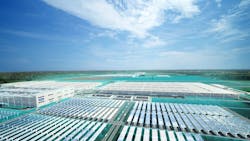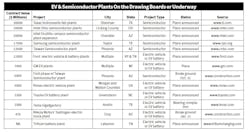New Semiconductor & EV Plants Expected to Fuel $130-Billion Construction Surge
The Feb. 9 announcement that Tritium, an Australian EV charging company, plans to build a factory in Lebanon, TN, that will eventually be capable of manufacturing up to 30,000 DC chargers annually is the latest example of an EV or semiconductor manufacturer with plans to build a massive factory in the United States.
According to Electrical Marketing research, these companies have announced plans for no less than $130.7 billion in facility construction in the coming years to produce electric vehicles, EV charging stations and semiconductors in the United States (see chart on page 3). When you consider that electrical construction materials typically account for 10% of a construction job, these plants will provide electrical manufacturers, contractors, distributors, reps, design firms and other channel partners with a $13 billion-plus market opportunity.
While the scale of the expected investment in facilities for electric vehicle or battery construction is indeed mammoth, it pales in comparison to what’s going on in the semiconductor market, where Intel, Samsung, Taiwan Semiconductor and Texas Instruments plan to spend $105 billion on new chip manufacturing plants. The biggest of them all is $30-billion manufacturing campus Texas Instruments says it will build in Sherman, TX. Intel made headlines last month when it announced that it would be spending $20 billion on greenfield semiconductor plants in Licking County, OH. The company is also spending $20 billion on an existing facility in Chandler, AZ.
The EV and semiconductor industries will be able to tap into several financial and government incentives to fuel some of this growth. The Biden Infrastructure bill passed last year includes $7.5 billion to assist in the construction of a national EV charging network; a surprising number of electric utilities are offering a robust mix of rebates for the installation of commercial and residential EV chargers; and both houses of Congress have passed bills with federal subsidies for domestic semiconductor production.
The House of Representatives passed a bill on Feb. 4 that would provide $52 billion in federal subsidies, and on June 8, 2021 the Senate passed the U.S. Innovation and Competition Act, which includes the same level of funding for that goal. Once the Senate and House hammer out their differences on the legislation, it’s expected to have enough bipartisan support to be signed into law.

